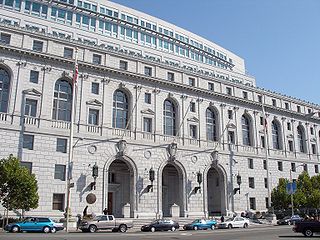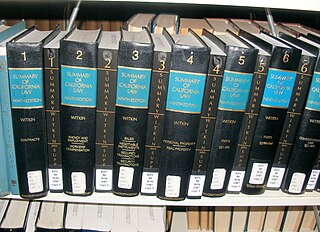Related Research Articles

Proposition 22 was a law enacted by California voters in March 2000 to prevent marriage between same-sex couples. In May 2008, it was struck down by the California Supreme Court as contrary to the state constitution.

Apple v. Does was a high-profile legal proceeding in the USA notable for bringing into question the breadth of the shield law protecting journalists from being forced to reveal their sources, and whether that law applied to online news journalists writing about corporate trade secrets. The case was also notable for the large collection of amici curiae who joined in the matter.
In tort law, a duty of care is a legal obligation which is imposed on an individual requiring adherence to a standard of reasonable care while performing any acts that could foreseeably harm others. It is the first element that must be established to proceed with an action in negligence. The claimant must be able to show a duty of care imposed by law which the defendant has breached. In turn, breaching a duty may subject an individual to liability. The duty of care may be imposed by operation of law between individuals who have no current direct relationship but eventually become related in some manner, as defined by common law.
A self-authenticating document, under the law of evidence in the United States, is any document that can be admitted into evidence at a trial without proof being submitted to support the claim that the document is what it appears to be. Several categories of documents are deemed to be self-authenticating:
- Certified copy of public or business records;
- Official publications of government agencies;
- Newspaper articles;
- Trade inscriptions, such as labels on products;
- Acknowledged documents ; and
- Commercial paper under the Uniform Commercial Code.
Tortious interference, also known as intentional interference with contractual relations, in the common law of torts, occurs when one person intentionally damages someone else's contractual or business relationships with a third party causing economic harm. For example, someone could use blackmail to induce a contractor into breaking a contract or they could obstruct someone's ability to honor a contract with a client by deliberately refusing to deliver necessary goods.
The Uniform Trade Secrets Act (UTSA), published by the Uniform Law Commission (ULC) in 1979 and amended in 1985, is a Uniform Act promulgated for adoption by states in the United States. One goal of the UTSA is to make the state laws governing trade secrets uniform, which is especially important for companies that operate in more than one state. Historically, the law governing misappropriation of trade secrets developed separately in each state.
The California Consumers Legal Remedies Act ("CLRA") is the name for California Civil Code §§ 1750 et seq. The CLRA declare unlawful several "methods of competition and unfair or deceptive acts or practices undertaken by any person in a transaction intended to result or which results in the sale or lease of goods or services to any consumer". Forbidden practices include misrepresenting the source of the good and services, representing reconditioned goods as new, advertising goods without having the expected demand in stock, representing a repair is needed when it is not, representing rebates that have hidden conditions, and misrepresenting the authority of a salesman to close a deal.
The multinational technology corporation Apple Inc. has been a participant in various legal proceedings and claims since it began operation and, like its competitors and peers, engages in litigation in its normal course of business for a variety of reasons. In particular, Apple is known for and promotes itself as actively and aggressively enforcing its intellectual property interests. From the 1980s to the present, Apple has been plaintiff or defendant in civil actions in the United States and other countries. Some of these actions have determined significant case law for the information technology industry and many have captured the attention of the public and media. Apple's litigation generally involves intellectual property disputes, but the company has also been a party in lawsuits that include antitrust claims, consumer actions, commercial unfair trade practice suits, defamation claims, and corporate espionage, among other matters.

In contract law, a non-compete clause, or covenant not to compete (CNC), is a clause under which one party agrees not to enter into or start a similar profession or trade in competition against another party. Some courts refer to these as "restrictive covenants." As a contract provision, a CNC is bound by traditional contract requirements including the consideration doctrine.

Proposition 218 was an adopted initiative constitutional amendment which revolutionized local and regional government finance in California. Called the "Right to Vote on Taxes Act," it was sponsored by the Howard Jarvis Taxpayers Association as a constitutional follow-up to the landmark property tax reduction initiative constitutional amendment, Proposition 13, approved in 1978.

The law of California consists of several levels, including constitutional, statutory, and regulatory law, as well as case law. The California Codes form the general statutory law.
The Unruh Civil Rights Act is a piece of California legislation that specifically outlaws discrimination based on sex, race, color, religion, ancestry, national origin, age, disability, medical condition, genetic information, marital status, or sexual orientation. This law applies to all businesses in California, including hotels and motels, restaurants, theaters, hospitals, barber and beauty shops, housing accommodations, and retail establishments. The law was enacted in 1959 and was named for its author, Jesse M. Unruh. The Unruh Civil Rights Act is codified as California Civil Code section 51.
The California Online Privacy Protection Act of 2003 (CalOPPA), effective as of July 1, 2004 and amended in 2013, is the first state law in the United States requiring commercial websites on the World Wide Web and online services to include a privacy policy on their website. According to this California State Law, under the Business and Professions Code, Division 8 Special Business Regulations, Chapter 22 Internet Privacy Requirements, operators of commercial websites that collect Personally Identifiable Information (PII) from California's residents are required to conspicuously post and comply with a privacy policy that meets specific requirements. A website operator who fails to post their privacy policy within 30 days after being notified about noncompliance, will be deemed in violation. PII includes such information as name, street address, email address, telephone number, date of birth, Social Security number, or other details about a person that could allow a consumer to be contacted physically or online.
The California Public Records Act was a law passed by the California State Legislature and signed by the governor in 1968 requiring inspection or disclosure of governmental records to the public upon request, unless exempted by law.
A reservation of rights, in American legal practice, is a statement that one is intentionally retaining his full legal rights to warn others of those rights. The notice avoids later claims that one waived legal rights that were held under a contract, copyright law, or any other applicable law.

Silvaco Data Systems v. Intel Corp was a trade secrets case heard before the California Court of Appeal for the Sixth District. Silvaco sued Intel for misappropriation of trade secrets because Intel used software produced by a third-party that had misappropriated Silvaco's trade secrets. The appeals court affirmed the decision of the trial court to grant summary judgment in favor of Intel, finding that merely using infringing software does not constitute a trade secret infringement in itself.
The Rutter Group, founded by William Rutter, is a business of Thomson Reuters that publishes materials for lawyers and judges in the United States, with a particular focus on California. The Rutter Group is well known for its Rutter Group Practice Guides, which are written and edited by famous lawyers and judges. Courts have cited these treatises in almost 8,000 legal opinions, and they have been called the 'bible' for litigators.
Raymond Paul Boucher is an American trial attorney. Throughout his career, Boucher has represented clients in a wide range of matters including consumer litigation, construction defect litigation, product liability, toxic tort litigation and employment discrimination. He served as lead attorney in the landmark $660-million sexual-abuse settlement with the Catholic archdiocese where he represented over 250 abuse victims in the July 2007 settlement. He was able to help secure over one billion dollars in recovery for victims of abuse by Catholic Priests in Southern California.
In addition to federal laws, each state has its own unfair competition law to prohibit false and misleading advertising. In California, one such statute is the Unfair Competition Law [hereinafter “UCL”], Business and Professions Code §§ 17200 et seq. The UCL “borrows heavily from section 5 of the Federal Trade Commission Act” but has developed its own body of case law.
Ronald Richards is a Beverly Hills, California based criminal defense and civil litigation attorney who has made national media appearances as a legal expert commentator. He was the first lawyer to be cited on California Proposition 215 (1996), the medical marijuana statute, and worked as a professor of law at the San Fernando Valley College of Law from 2006 to 2007. Since 2011 Richards has sat as a temporary judge on the Los Angeles Superior Court.